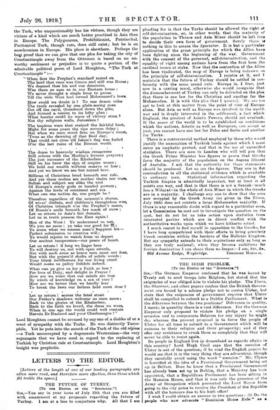LETTERS TO THE EDITOR.
[Letters of the length of one of our leading paragraphs are often more read, and therefore more effective, than those which fill treble the space..]
THE FUTURE OF TURKEY.
[To THE EDITOR OP THE " SPECTATOR."] S IR, —You say in your issue of July 12th that you are filled with amazement at my proposals regarding the future of Turkey. I am at a. loss to conjecture why. All that I am pleading for is that the Turks should be allowed the right of self-determination, or, in other words, that the majority of the population in Thrace and Asia Minor should be left free to decide their own form of government. Surely there Ia nothing in this to amaze the Spectator. It is but a particular application of the great principle for which the Allies have been fighting since the beginning of the war. Government with the consent of the governed, self-determination, and the equality of right among nations have from the first been the cardinal issues at stake. Now that the contention of the Allies has been vindicated, the map of Europe is being redrawn on the principle of self-determination. I rejoice at it, and I maintain that the future of Turkey should be settled in con- formity with the same sound rule. Europe is, I fear, just now in a canting mood, otherwise she would recognize that the dismemberment of Turkey can only be defended on the plea that there is one law for the Christian and another for the Muhamadan. It is with this plea that I quarrel. We are too apt to look at this matter from the point of view of Europe alone. But Asia as well as Europe was involved in the world- war and is deeply interested in the settlement, a fact which England, the greatest of Asiatic Powers, should not overlook. If the peace of the world is to be established on conditions whieh the nations, Asiatic as well as European, can accept as just, you cannot have one law for Poles and Serbs and another for Turks.
There is a controversial method employed by those who would justify the annexation of Turkish lands against which I must enter an emphatic protest, and that is the use of unverified statistics. There are men in London who will tell you that the Greek Prime Minister has figures to prove that Greeks form the majority of the population on the Aegean littoral of Anatolia. I ask that the authority for those statements should be produced. Lot us see the figures. They are in fiat contradiction to all the statistical evidence which is available to ordinary men. Statistical information regarding the Turkish Empire is admittedly imperfect, but at least it all poirfts one way, and that is that there is not a Sanjak—much less a Wilayat—in the whole of Asia Minor in which the Greeks are in a majority. I challenge any one to show that the area now occupied by the Greek Army (as given in the Times, July 18th) does not contain a large Muhamadan majority. If there is any reasonable doubt with regard to a particular area, let a Commission be sent out to investigate the question on t ho spot, but do not let us take action upon statistics from interested parties which are in direct conflict with the authoritative works upon which we have hitherto relied.
I much regret to find myself in opposition to the Greeks, for I have long sympathized with their efforts to bring genuineiy Greek countries within the borders of the Hellenic kingdom. But my sympathy extends to their aspirations only as long as they are truly national; when they become ambitious for foreign domination I can share them no longer.—I am, Sir, &a., Old Avenue Lodge, Weybridge. THEODORE MOR I ON.


































 Previous page
Previous page